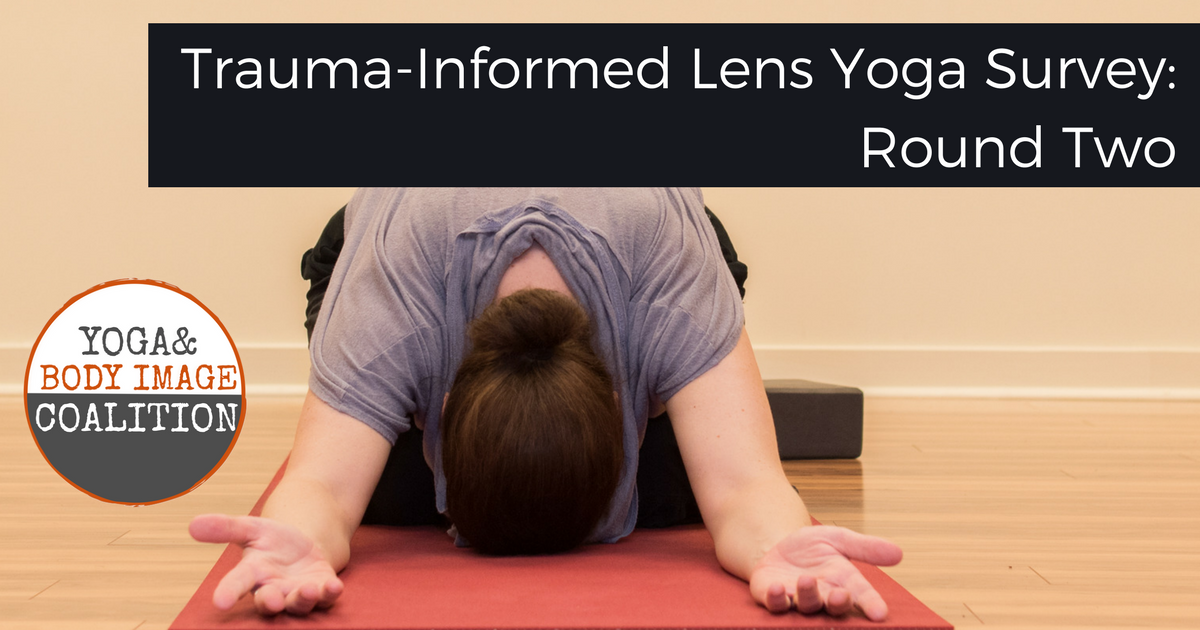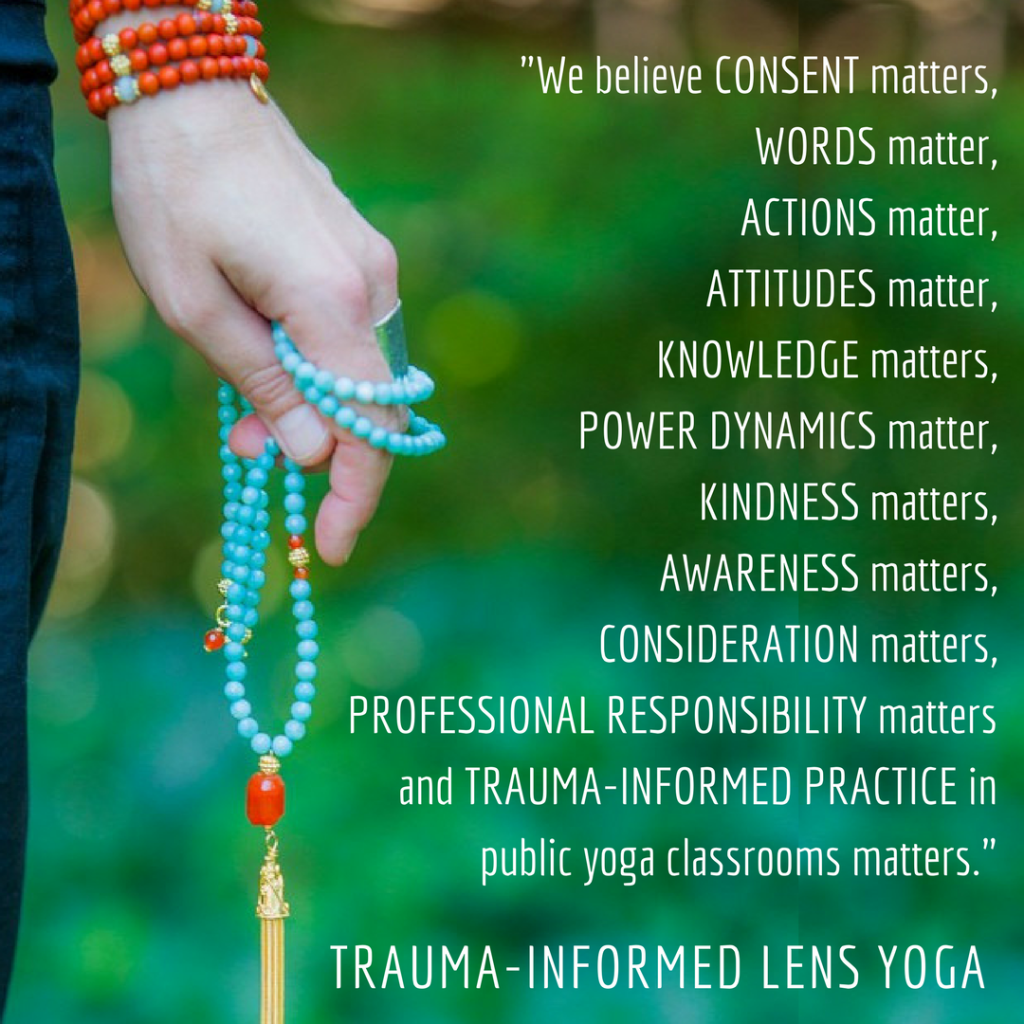Trauma-Informed Lens Yoga Survey: Round Two
April 13, 2017
Trauma-Informed Lens Yoga believes CONSENT matters, WORDS matter, ACTIONS matter, ATTITUDES matter, KNOWLEDGE matters, POWER DYNAMICS matter, KINDNESS matters, AWARENESS matters,  CONSIDERATION matters, PROFESSIONAL RESPONSIBILITY matters and TRAUMA-INFORMED PRACTICE in public yoga classrooms matters.
CONSIDERATION matters, PROFESSIONAL RESPONSIBILITY matters and TRAUMA-INFORMED PRACTICE in public yoga classrooms matters.
Trauma-Informed Lens Yoga Survey: Round Two
Thank you to everyone that participated in the first round of the Trauma-Informed Lens Yoga survey. We received a strong response to our first round survey from yoga practitioners, yoga teachers and individuals considering yoga, and the preliminary results compelled us to learn more.
Of the 129 participants in the first survey, 20.2% reported experiencing five first-hand traumatic experiences, 10.9% four traumas, 16.3% three traumas, 16.3% two traumas, 12.4% one trauma, and only 7% reported zero traumas. This is only a snapshot of the results, and the numbers are enough to indicate the importance of further study of this topic. To see the full results of the round one survey, go to http://www.traumainformedlensyoga.com/resources-and-articles
We believe in the potential of yoga and are inspired by yoga teachers that commit to creating space that allows for the mind-body connection, self-discovery, and even healing. Regardless of what our intention is as a yoga teacher, our students have their unique experience in yoga classes—some positive and some negative. Since the yoga teacher is so central to most yoga classes, it is our words and actions that often determine this experience.
In the years that we have be leading our workshops and trainings, Teaching Public Yoga Classes Through a Trauma-Informed Lens, we have learned a great deal about the student experience. We begin with a focus on trauma-informed teaching as a way of acknowledging the amount of trauma that exists in any public yoga classroom. Our intention goes beyond this, however, to demonstrate how important it is to shift the focus from the assumptions we make about our students to the realities of what they bring with them onto the mat.
I would argue that we as yoga teachers have experienced some sort of transformation or healing in our own yoga practice, and that profound connection leads us to want to share the practice with others. The problem is that our teaching often reflects our own experience and inadvertently makes assumptions about others. It is the assumption in our teaching approach that we question.
For sure, we all come to the mat for different reasons, and there is room for it all. As teachers, however, we have the added responsibility of keeping our students safe. This safety is not just physical but also emotional. We believe that teaching in a trauma-informed way is a universal precaution that puts the student’s needs first and better ensures the safety of all that are in the class.
Our integrity as teachers depends on us continually growing, widening our perspective, and getting better at what we do. It is this that motivates us to learn more about the experience of our students. The second round of our survey goes into more depth of what inspires students to come back to class, what discourages them from returning, how they perceive the role of the teacher, and how important the teacher’s words and actions are in their experience in a yoga classroom.
Our hope is to bring light to specifics of what we do or don’t do that has an impact, positive and negative, on our students. Please consider participating in our second round survey and sharing as widely as possible (both new participants and those who participated in the first survey are welcome). We will share the results in a later post.
Gwen Soffer, E-RYT
Co-founder Trauma-Informed Lens Yoga, co-founder Enso yoga studio
www.traumainformedlensyoga.com
TO PARTICIPATE IN THE SURVEY CLICK HERE
This survey was not held to the same standards as a scientific study nor did an institutional review board oversee it. Its purpose was to help Trauma-Informed Lens Yoga to become better informed and guide their future research in the coming months.
Train with Gwen Soffer in her Trauma-Informed Lens Yoga Teacher Certificate Program at enso Yoga in Pennsylvania.
Trauma-Informed Lens Yoga Research Team:
Gwen Soffer, E-RYT
Gwen is the co-founder of Enso yoga studio in Media, Pa. and teaches all of her public classes through a trauma-informed lens. She is a Masters in Social Work and Trauma Certificate candidate at Widener University. She teaches weekly public yoga classes as well as private sessions to groups managing trauma. Gwen is co-lead of Trauma-Informed Lens Yoga.
Melissa Lucchesi
Melissa is the Founder and Director of Voices, Inc. in Media, Pa., an organization dedicated to helping survivors of sexual and domestic abuse heal from trauma. She has a bachelor’s degree in psychology from Widener University and is currently enrolled in Chestnut Hill College’s Masters of Clinical and Counseling Psychology and Trauma Studies program. Melissa is co-lead of Trauma-Informed Lens Yoga.
Alyssa Matteucci
Alyssa is a research associate at the Wharton Social Impact Initiative at the University of Pennsylvania and a yoga teacher. Prior to her work at Wharton, Alyssa worked as a manager and research specialist for Dr. Angela Duckworth at the Duckworth and Character Labs, and in Program Operations at the John Templeton Foundation. Alyssa earned her BS at Drexel University in 2013, where she studied psychology.
